“This is not a hierarchy of any kind. It’s being true to what you want, reaching for your dreams”
In this episode I’m joined by the astounding social worker and psychotherapist, Dr. Julie Hanks, for an astonishing conversation about aspirational shame, imposter syndrome, why far too many women feel prohibited from chasing their dreams, and how we can strive to recognize and accept ourselves as the people we’re meant to be.
Our Guest
Dr. Julie Hanks
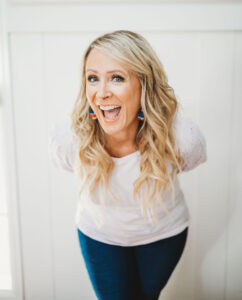
Julie de Azevedo Hanks, PhD, LCSW is a licensed clinical social worker and psychotherapist with nearly 30 years’ experience providing a safe place for healing conversations that educate and empower women to prioritize their dreams, revolutionize their families, and personalize their faith. She is the founder and director of Wasatch Family Therapy, an outpatient therapy clinic, and the author of The Burnout Cure and The Assertiveness Guide for Women. Dr. Hanks is a local and national media contributor, a coach, a private practice consultant, and an award-winning performing songwriter. Dr. Hanks is the host of Ask Dr. Julie Hanks podcast and creator of online courses helping women navigate motherhood, relationships, and faith. A native Californian, Hanks currently lives with her family in Sandy, UT. For additional resources visit DrJulieHanks.com or connect with @drjuliehanks on social media.
An Interview with
Dr. Julie Hanks
Amy Allebest: I want to just ask you, Julie, what comes to your mind when you think of some of the ways, or maybe one particular way, that you’ve experienced patriarchy in your life?
Julie Hanks: Yeah, I think about the way I was raised. I grew up in Southern California, right in the heart of the entertainment industry. It was just magical. My extended family had a TV show in the 60s and 70s, my dad was a musician on many television shows, and it just seemed like there was so much creative expression and success that was possible for my life. And then I also grew up as an active member of the LDS Church, and so I’ll speak specifically about patriarchy there.
In my family, the roles were very traditional, based on the patriarchal family where the dad’s in charge and mom takes care of the home and family. And so I have these kind of contradictory worlds. Like, I saw all this possibility. And then I also saw, wait a second, I’m a woman. I have a very specific role that I was taught about in my church. And so that was really disheartening to me. I remember as a very little girl thinking I should have been born a boy. Like that would have been better than to be a girl. I knew it from really early on, so as I grew I had all of these ideas and talent and passions, and they were outside–I mean, they included being a wife and a mother, which is what I was told God wanted me to be, and that’s also what I wanted, I value relationships–but I also wanted so many other things for my life. This created what I’ve coined as aspirational shame. It’s the belief that desire for achievement outside of home and family means that I’m not a good person. My desires meant that I was bad, like somehow I was flawed and I needed to tone it down, get rid of those desires, because patriarchy was telling me: your purpose is to be a wife and mother.
I carried this shame with me for decades. And in spite of the shame, I was able to kind of…I’m a people-pleasing rebel, I like to say, so I kind of pleased patriarchy. I got married young, I had kids, I’m a wife and a mother. I have four kids. I love my family. And the rebellious part of me was like, this is not going to control me, I’m going to be true to my passions and interests and goals. And so I’ve also accomplished things outside of my family: owning a business, owning my practice, going to grad school, getting a PhD, being a musician…
AA: Yeah, that’s right. That whole other performing and being a songwriter…
JH: And so even though I did those things, I still felt like it must mean I’m a bad person. I also felt like I didn’t have a choice. Expressing myself is such a part of who I am. But I did it with this burden of shame that I think was a huge result of patriarchy, that my role was limited and that those things that I wanted to accomplish…I felt like it was too much, it was too big, I shouldn’t want that, I shouldn’t want things for myself. Right? My goal is to support a husband and children. And so as I lived my life with my husband and our kids, and continued to pursue my goals and dreams, I was aware of patriarchy in the questions that people asked me, like: Why are you going to grad school when you have a baby to take care of? Or, who’s going to watch your kids while you see clients? Or, oh, I could never leave my kids with a babysitter and let someone else raise my children, aren’t you going to miss them? I felt like my choices were suspect, and I think that was all informed by patriarchal, rigid gender roles.
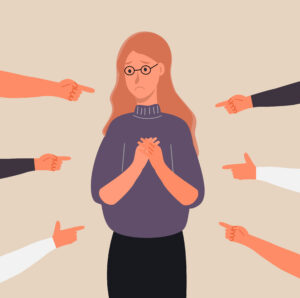
I wrote about this experience a few years ago for a website called Aspiring Mormon Women, and what happened in kind of putting a name to and explaining this experience—calling it aspirational shame—really resonated with a lot of conservative religious women. They’re like, oh my gosh, I have that. I have that, that explains what I’ve been experiencing. And it was so validating for me because I realized I’m not alone. I knew I wasn’t, but it’s just nice to hear you’re not the only one, I can relate, your story resonates with me.
AA: So, if I can interject, I have to say just yesterday I went on a walk with a friend and I was talking about how (I’m working on my master’s thesis right now) and we were talking about how writing a long paper is hard for everybody, and working during grad school, that’s hard for everybody. But I was saying there’s this other thing that makes it hard, that takes my energy, that I have to work against in addition to just the human experience of self doubt, and like, oh, this is hard. I don’t know if I can do it.
I have this voice in my head and it sounds just like a Virginia Woolf novel. I don’t know if you’ve read To The Lighthouse, but there’s this painter named Lily Briscoe and as she’s painting, she has this voice that says women can’t paint, women can’t write, and it’s the voices of actual people she’s heard, but also just the social construct. And I said, I have that. It’s this constant feeling of like, who do you think you are? You’re out of your sphere, you’re out of your box. You don’t have a right to do this. And so having that label to put on it like, yes, that’s what it is. It’s because…again, men feel self-doubt too and men feel impostor syndrome, but it’s different. You’re bad, not just for doing it, you’re bad for wanting it. Because you’re a woman.
JH: Yes, exactly, because you’re a woman. It’s not just that it’s different than self-doubt. It’s like you don’t have permission by society to want this, let alone actually execute it.
AA: Yep. Thanks. Alright. It’s kind of that it means so much energy, always feeling like I had to soothe myself from those messages. And like, no, it’s okay, you can do this. And I had to battle these messages. And those messages continued to come at me. It wasn’t just my early life, it was all throughout my life. And a lot of it came in, like I said, in the form of those questions.
JH: Yes, that you get from other people, too.
AA: Can I ask one more question here, at this point in your story too? I’m so glad you pointed out—what were the specific messages that you were getting and if you remembered any of them? Because sometimes I can point to a specific conversation I’ve had, and sometimes it’s just kind of this…again, the water you swim in, and you don’t really remember, but I was going to ask—in addition to questions that you were getting when you were going back to school, or when you were doing your career—do you remember specific messages that you got growing up? Or was it more just the example of people you saw, or both?
JH: It was both. It was explicitly said at church: this is a woman’s place. This is a woman’s role. It was modeled by my parents. It was implied in the school that my parents wanted me to go to. And I knew I was going there to find a husband. It wasn’t to get an education. I mean, I got an education, which was surprising, and right as I was graduating high school, there were some very strong messages from Latter Day Saints Church leaders about women’s place being in the home, and “come home from your employment” and “women working is the cause of divorce of many divorces” and things like that. So I remember those explicitly and I also remember, as a child, or maybe teenager, looking around and really recognizing I don’t know any women whose lives I want to emulate. There are certain aspects—like my mom is so supportive and loving, I love that about her. And there’s so many women that I loved, and that were examples in certain areas, but there was no one that I was like I want to grow up and have that life. And so I felt really alone in what I wanted, because I didn’t see anyone who was combining family and creative expression and education and the things that I wanted. I didn’t see that. And so that I think is a really powerful message that, well, maybe it doesn’t even exist. And of course, I’m bad for even wanting that.
My desires meant that I was bad, like somehow I was flawed and I needed to tone it down, get rid of those desires…
AA: Right. Okay, as long as I’m asking some questions, I have another one for you Julie. This is a little bit of a tricky one, because I have several friends—and most of my friends, like you and I, grew up in a conservative, traditional environment where I can’t really think of any of my friends’ moms who had careers at all. So that wasn’t an example for me. My mom was a wonderful stay-home mom, and I don’t think she ever had any career aspirations. And so I also felt a little bit like an alien and like there was something wrong with me. But I have some close friends who had different experiences, also within our same faith tradition, where their mothers actually did have really successful careers, and a couple of friends specifically where their mothers had achieved these amazing careers, their mothers were really celebrated by the Church.
I’ve had really complicated feelings about this because on one hand, I think like, that’s so awesome, that’s so great that they did it. I admire that they’re mothers, I think it’s incredible that they were able to do that and that they chose to do what they did. But I also think of all those women…and there were many sermons preached in our church, especially like you just said in the 70s, and 80s, and even the 90s, that literally, you know, really said “women come home, you’re abandoning your children and the fabric of society is disintegrating, because all of these women are choosing to have careers, which means they don’t love their families,” basically. And I’m thinking of all the women that were in the congregations listening to that and thinking, well, I wanted to be a surgeon, but okay, I’ll do what God wants me to do. I’ll make this noble sacrifice on the altar. Or I wanted to be a concert violinist or a CEO, but no, I will make the sacrifice. I’ll do what God is asking me to do.
You know, in our church we say “Follow the Prophet. He knows the way,” and make that sacrifice. And so the patriarchal leaders of the Church demand that women make that sacrifice. But then if there’s a one-off example that did break the rules, like they didn’t make the sacrifice, then the Church might turn around and celebrate that woman anyway. And then even sometimes people point to them and say, oh, women aren’t repressed, look at this woman who is a celebrated this or that, and she’s Mormon and she did it. My heart breaks for all of the women who did make the sacrifice and thought, wait a second, I could have done that too. But I thought I was being good. And I felt too much guilt and shame to do it. So now how could you celebrate these women? It actually hurts a lot to me and kind of makes me mad.
JH: Yes, I do know what you’re saying. I also think there’s something interesting. I think if it makes the patriarchy look good, then it’s elevated. And, as a professional musician myself and a songwriter, there is an exemption for artistic endeavors because it’s developing your talents, which is also a big push in our Church/faith tradition. When I was really involved in producing music and touring and things like that, that was not as suspect as my therapy career, because that was developing my talents. And people saw it kind of as a hobby. Oh, it’s a really nice hobby that really became successful, instead of like, a career, right? So if it’s in the arts, there’s a little bit of a difference because you can go well, I’m developing my talents.
AA: That’s totally true. And I’m guessing too, that even therapy would be more acceptable than being a CEO or something because you’re helping somebody, right? I’m guessing there’s maybe a hierarchy even of what it was suitable for a woman to do. Like you could be a nurse, but don’t be a surgeon. You could be a teacher maybe. If you are gonna work, then these are the acceptable ones: if they help other people, or like you said, if they’re in the arts.
This is a woman’s place. This is a woman’s role. It was modeled by my parents. It was implied in the school that my parents wanted me to go to. And I knew I was going there to find a husband. It wasn’t to get an education.
JH: I’ve not thought of that. That’s so interesting, helping other people. I’ve done things that have gone in line with that and also rebelled. I’m also a CEO, I also own two businesses. I actually don’t do direct therapy anymore. I manage two businesses, so yeah…that’s my people-pleasing rebel. I’ve gone into a traditional female profession, except it requires advanced degrees, so that makes it a little bit more suspect. But yeah, it’s really interesting how there’s an exemption for certain things. Like, it’s okay to be a teacher because then you’re home when your kids are home. There’s kind of these different rules for women.
I’ve had a couple of interesting conversations with my dad. He’s a classically trained concert pianist, arranger, producer, and musician; he’s been a successful musician his whole life. And I said, “Dad, what if someone said you have to be an accountant, God wants you to be an accountant? And if you’re not an accountant, you’re not a good righteous man. How would you feel?” And I think he finally got it. How if you flip it around, that makes no sense. But I’ve been told this is what God wants me to do with my time and energy. And if I don’t do that, I’m not righteous. It’s like being told you have to be an accountant all day, every day. And that’s it. So he finally got it. And that was kind of nice, too. I always am happy when the lightbulb goes on for a man in my life that I care about.
I also had another, this is a more recent discussion, where I was talking about an article about gender roles in the LDS Church, and I had put some things together that were exciting to me and, and he said, “Are you sure this article isn’t just you trying to justify your choices?”
AA: Oh, boy.
JH: And I looked at him, I said, “Have you ever had to justify your choices? Have you ever had to justify being a musician and having a family? Have you ever…” and he got it. And I was like, that is an example of patriarchy, right? Like my dad telling me—even though he was joking, it was still informed by that idea of you’re not supposed to want this or you have to justify your choices. And that was just a really interesting conversation. I went back later and said, “You know, I just want you to know how much that hurt me. And how I need an apology.” And he did. And he’s like, I am so sorry. That was really ignorant. And I’m like, yes. For you. So I assigned him to read Riane Eisler’s first book, The Chalice and the Blade.
AA: Good. Good for you. So how do you counsel women, for example, those women who said…well, how would you counsel both women? How did you do the therapy on yourself so that you eventually got over the aspirational shame? And then how do you counsel the women who let that aspirational shame stop them from doing the things that they felt like, they made this godly sacrifice, and then they see other women and they think, wait a second, you got to do both. And then you feel kind of judgy and jealous at the same time?
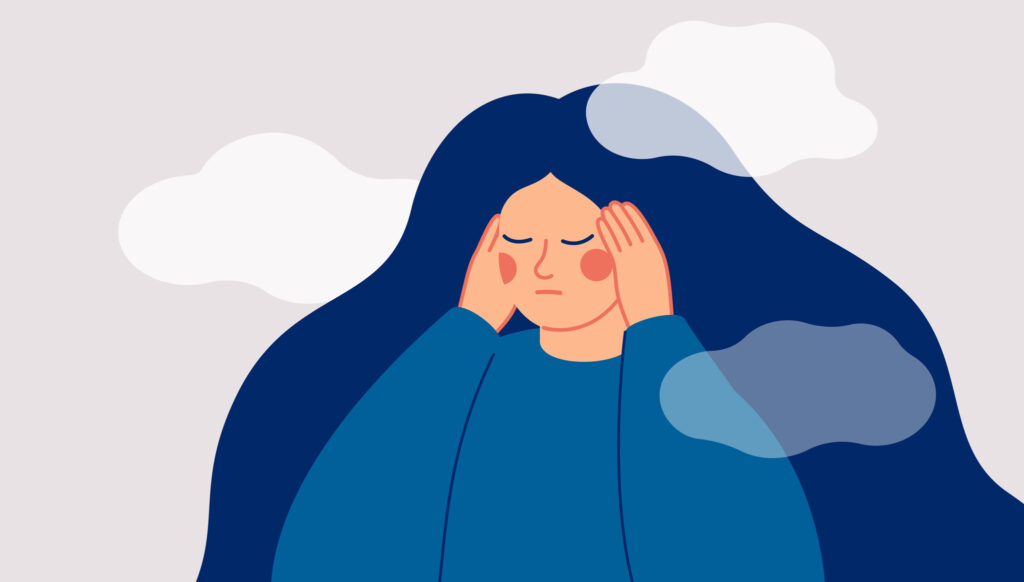
JH: Yeah, it’s really hard. This kind of answers your question, but kind of varied off. After I wrote this article, I was like, well, I guess aspirational shame is a thing, I might want to do some research and further define what it is and explore people’s experience or see if other people have experienced it, and then what helped resolve it. So I got almost 700 surveys from Latter-Day Saint women and it’s been fascinating. Can I share that because that guides how I talk with women about this?
AA: Yeah, yeah.
JH: So I asked, “Have you experienced aspirational shame?” And 70% said Yes. And another 12% said Maybe. So it was 81% of all LDS women surveyed that have experienced shame. That’s a lot of wasted energy. That number actually shocked me that it was that high, and what I found was that aspirational shame is a very relational experience. It’s triggered, it’s an individual emotion or a thought that we have experienced, but it’s triggered by expectations of self, family, community, and deity. So that was kind of interesting. And then I ranked the top 10 ways that women have reduced or resolved their aspirational shame, and I think it’s fascinating. So I’m kind of nerding out about research here, but the number 1 most commonly mentioned in the research was feeling God’s support. So a personal answer that God supports what I’m doing, God supports my choices. And that’s true for me, I really felt…you know, church leaders are saying this, but I’m really feeling this, and so I’m the only one responsible for my life. I’m gonna go with what I feel inspired to do. The 2nd one is to leave the Church or distance from the Church. This is specifically for Latter-Day Saint women, but I’m guessing it applies to many conservative religious women. So becoming less involved, or taking a step back, or leaving altogether, was the second most common way that women dealt with shame, with aspirational shame specifically. So we’re losing lots of really sharp women because church is triggering that shame. The 3rd is a supportive husband and family. So having a supportive partner and extended family is really key. Finding a like-minded community was number 4. And then number 5 is self-acceptance and self-awareness. So just kind of accepting who you are, and what your gifts are. So those are the top five.
Number 6 was to care less about what others think. I love it, it’s like finally just going, you know what, I’m doing me. And stop taking things personally and taking comments personally, and just do your own thing. Having mentors and other examples was number 7. Number 8 was intellectual awareness or recognition. A lot of people recognize learning about patriarchy, learning about different constructs that give you a different lens to look at your experience through–that’s number eight. 9 was positive work experiences. So women who were employed, having really great experiences, going this isn’t bad. This isn’t wrong. This is wonderful. And I especially love number 10: going to therapy. So that was number 10. A lot of people mentioned, I went to therapy, I learned about Brené Brown and shame, or we went to marriage counseling to help my husband get on board with supporting my aspirations. So those are all ways that women have resolved their shame based on that research.
For me, one of the things that really helped was working on my dissertation study, where I came across literature on highly creative women. And I realized, oh my gosh, I’m a highly creative woman, there’s a label for me. And there’s research about people like me who have the need to create and disseminate their work into the larger culture. It was just this big relief that oh, nothing’s wrong with me, this is a thing. Just naming aspirational shame, so people can go “it’s a thing.” So for me, I’m a highly creative woman. I studied, for my dissertation, creative productivity of mothers. So because childbearing years are the peak years of productivity for creative people—the 20s and 30s, that’s when most people do their best-loved work or their most well-known or whatever—anyway, I got a personal diagnosis of “I’m a highly creative woman.”
AA: That is so cool.
…it was 81% of all LDS women surveyed that have experienced shame. That’s a lot of wasted energy.
JH: And so that’s what I studied. For my literature review, I compiled a sketch based on the research of what a highly creative woman is, and how highly creative women define themselves and their core in a way that’s different than other people: the purposeful creation of something novel or useful and putting it out into the world. And not everybody has that desire, and that’s great. People have their own talents, but that for me was like, you know, God made me this way, right? This can’t be bad. And that really helped resolve whatever remnants of shame were remaining. Because this was more recently. I graduated in 2015 and I was in my 40s, but I’m still wrestling with shame. And it’s just such a waste of energy, such a waste. So I love talking about aspirational shame because I want to empower women to feel like you’re not alone. You’re not alone in feeling this and it’s okay to take responsibility and do your thing.
AA: Yeah, all of those ten coping strategies and their methods of getting past. I think that was so useful. I was just taking all of those in and really relating to a lot of them. And that’s like you said, like you just described, having a label for it, oh, this is who I am. This is what I was born to do. This is the way God made me. Or for people who aren’t religious, just to say this is what I was born to do, right? This is what I want to spend my one wild and precious life doing. And I’m hearing, too, I’m again thinking about the waste and the tragedy of a woman getting, hopefully not to the end of her life, but well into life and thinking, wait, I made a sacrifice that wasn’t necessary. And then I had all of that potential, but that it’s not too late, hopefully, to then say, well, I’m going to start today and I’m going to start doing what I was born to do. And so some of those strategies of just getting comfortable in your own skin and letting go of what other people think about you. And like you said, pushing back when people ask rude questions, even if they’re not intending to be rude, but to say, hey, think about what you’re asking me right now. Has anybody ever asked you that? Have you ever had to justify yourself? I love that example that you shared.
JH: Thank you. Now, I also want to bring up that in the process of writing my dissertation I also realized how much I had devalued the care work that I had done and that my mom had done. And that was a result of patriarchy, that I have invested a lot of time in care work, in taking care of my family, and that’s just as valuable as my degrees or the paid work that I do. I really realized how valuable my mom’s contribution was to me and my siblings. There are nine of us and so this is…I really want to be clear: all work is valuable. This is not like, oh, well just a stay at home mom. No, if that’s what your calling is, that is amazing. Do it and own it. And if you feel multiple callings, follow those too. You know, it’s not that one is better than the other. This is not a hierarchy of any kind. It’s being true to what you want, reaching for your dreams. I really value the work that I’ve done in my home and building relationships with my family, and I just want to give a shoutout to my mom for the years that she invested in that. Because that is the fabric of life, that allows the support of all of our other endeavors.
AA: I’m so glad you mentioned that too. And like you talk about all the time, that’s true for all humans, right? Investing in relationships brings joy. Working hard and sweeping your own floor and making your own food. Taking care of your space that you live in as a human being. There’s something really important and deeply meaningful about that, right? That’s a human thing.
JH: Right. I really resist the gender roles. I say adults need to know how to care for a home. Adults need to know how to care for other human beings. Adults need to know how to provide for themselves and their family. Adults need to know how to maintain extended relationships with the community. These are adult things, not just for men or just for women. Things you need to know. How to care for a yard. How to manage money. Adults need to know these things. And it has nothing to do with what sex you were born.
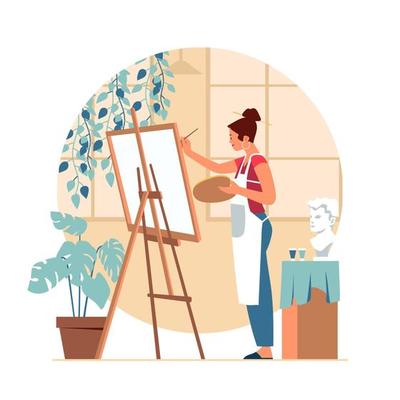
AA: Yes, I love that. And having relationships is so important. I just love it, really to bring forth what is within you as well. I’m thinking of my mom, too. And one thing I want to mention is that there are some people who—due to circumstances beyond their control—aren’t able to do the creative work that they want to do. My mom has struggled with chronic pain her whole life, and so all of the potential things that she might have liked to spend her time and her energy doing, she hasn’t been able to do as much as she’s wanted to. And so there are complicating factors, too.
JH: Oh, yeah.
AA: But yes, she gave us a wonderful growing-up. And some people’s talents and hobbies…they are things that you can just do in your home, and you don’t have that drive to put your work out into the world. And yeah, what I’m hearing you say is that’s perfectly fine, too. It’s just being true to yourself and doing what you were born to do, giving yourself permission to do it and doing what you enjoy and what calls to you, and whether you put it out in the world or not does not change its value.
JH: Mhm. That’s very patriarchal, that hierarchical thing. Like, this is better than this or paid work is better than unpaid work or if you’re an artist you have to put it out into the world, that’s what makes it legitimate. That’s just not true. Personal satisfaction and enjoying the process is just as valuable. And so I think not ranking things, not putting things in a hierarchy of this is better than that, working is better than staying home or staying home is better. Figure out what you need and what you want and what you feel called to do. And then, with whatever resources you have, do the best you can to fulfill that, whatever that is.
AA: I love it. So in thinking about these patriarchal constructs—where we get our message, from the top down, about what it’s okay for a woman to do, what it’s okay for a man to do—and on this theme that so many women experience aspirational shame if they feel their soul calling to them to do X, Y or Z, but they feel like, no, I can’t. That’s outside of my boundaries as a woman. For you, as someone who experienced that but then transcended it, is there one thing that you would counsel women to do who are currently experiencing that aspirational shame? Is there a mantra or one thing that you would counsel listeners to help them overcome that and live their best life that is free of shame and lets all of the parts of themselves flourish?
JH: Yes. All good desires are from God.
I’m a religious person, but you can use ‘good.’ I have learned that if I have a desire that is good, that’s going to make the world better, that’s going to help someone, that’s going to add to knowledge, I’m just assuming it’s from God to me. And so that’s part of claiming personal authority over your life. I realized in my early or my late teens, after this one landmark talk to women by an LDS Church leader I realized, yeah okay, but only I am going to have to answer for my life choices, for the development of my talents, for the use of my time, for the quality of my relationships. My parents aren’t going to answer that. This Church leader is not going to answer for me. My partner isn’t. My children aren’t. Only I am going to have to answer for how I used my time, talents, energy, and my life. And so just really taking responsibility and considering, you know, if you’re in a faith tradition, consider what the leaders are saying. There’s always wisdom that can be pulled from it. So I reframed that talk to “children need parents.” I’m going to take that from that talk. Children need parents and they need attention and nurturing. I can totally get on board with that. And my husband’s really good at that and we’re going to work together as a team. That’s kind of how I made sense of it and honored my own personal authority.
AA: Hmm. Hallelujah for you. Thank you so much for that. That was a powerful antidote to the shame and to all of these factors that inhibit us in our lives. That is just the perfect way to close out this conversation. I am so grateful for all of that wisdom and so thankful that you were willing to come back on the podcast. Dr. Julie Hanks, thank you so much.
JH: Thanks, Amy, for the invitation. It’s always delightful to talk with you.
it’s okay to take responsibility

and do your thing.
Listen to the Episode
&
Share your Comments with us below!

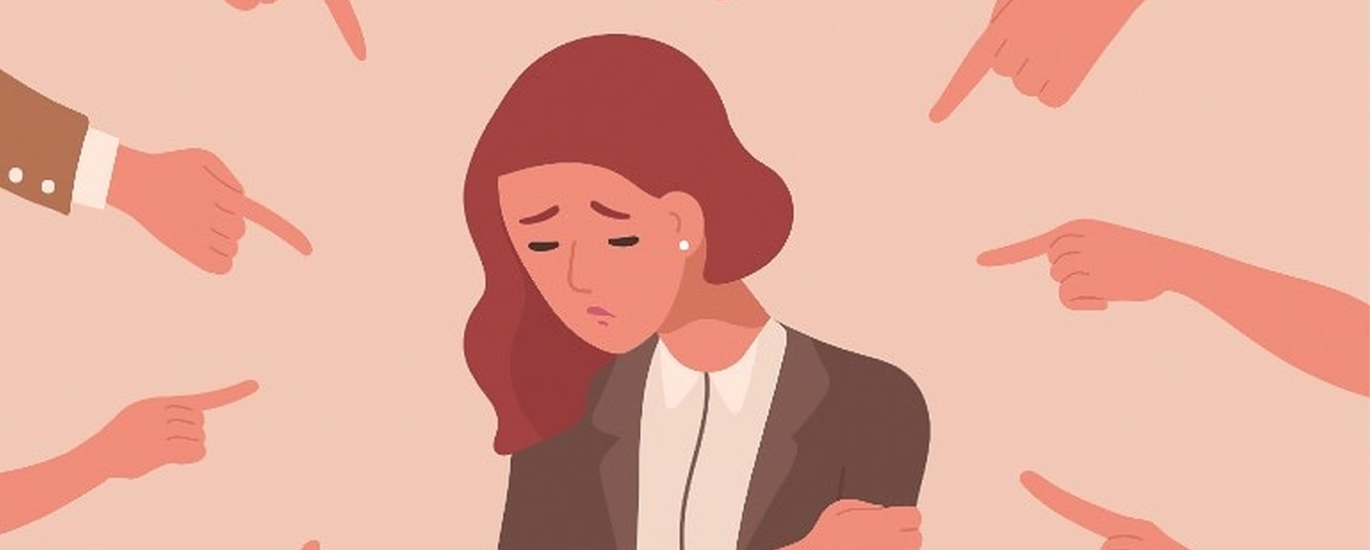
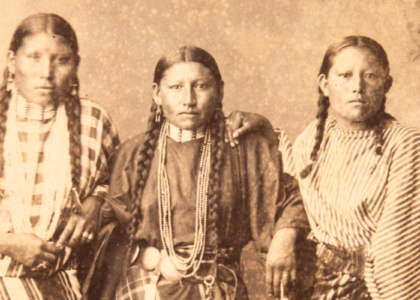


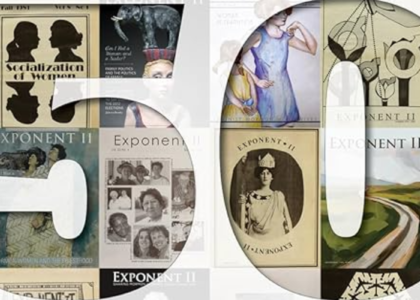
I loved your post.Really thank you! Fantastic.